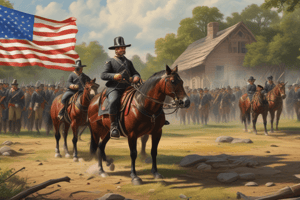Podcast
Questions and Answers
What primarily led to the outbreak of the United States' Civil War?
What primarily led to the outbreak of the United States' Civil War?
- Conflict over legislative representation in Congress
- Deep regional differences over economic, social, political, and moral issues (correct)
- Issues related to international trade
- Disagreements regarding industrialization
Which region of the United States became increasingly industrialized in the mid-18th century?
Which region of the United States became increasingly industrialized in the mid-18th century?
- The South
- The West
- The North (correct)
- The East
What was one of the most significant battles of the Civil War considered a turning point in July 1863?
What was one of the most significant battles of the Civil War considered a turning point in July 1863?
- Battle of Antietam
- Battle of Bull Run
- Battle of Vicksburg
- Battle of Gettysburg (correct)
What was a major issue that intensified tensions between the North and South after Abraham Lincoln's election?
What was a major issue that intensified tensions between the North and South after Abraham Lincoln's election?
Which concept was seen as necessary for maintaining the economy and social order in the South during the Civil War?
Which concept was seen as necessary for maintaining the economy and social order in the South during the Civil War?
What battle marked the end of General Robert E. Lee's invasion of the North?
What battle marked the end of General Robert E. Lee's invasion of the North?
Who was the President of the United States during the Civil War?
Who was the President of the United States during the Civil War?
Which battle was the first major battle of the Civil War that resulted in a Confederate victory?
Which battle was the first major battle of the Civil War that resulted in a Confederate victory?
Who played a crucial role in several high-profile losses for the Confederacy, including the Battle of Gettysburg?
Who played a crucial role in several high-profile losses for the Confederacy, including the Battle of Gettysburg?
How did the Civil War impact American society economically?
How did the Civil War impact American society economically?
Flashcards are hidden until you start studying
Study Notes
Civil War
The United States' Civil War was fought from 1861 to 1865 between the northern states (known as the Union) and the southern states that seceded from the United States and formed their own government (the Confederacy). This conflict began primarily due to deep regional differences over economic, social, political, and moral issues. Several factors contributed to its outbreak:
Causes
Economic Differences
In the mid-18th century, the Northern and Southern economies diverged. The North became increasingly industrialized, while the South remained largely agricultural. These differences led to tension when both regions struggled for legislative representation in Congress.
Slavery Issue
Slavery was another major cause of conflict. Although it had been outlawed in the North by 1780, it remained legal and prevalent in the South. Many people saw slavery as morally wrong and sought its abolition, while others believed it was necessary for maintaining the economy and social order.
Political Differences
The election of Abraham Lincoln, who opposed slavery, further intensified tensions between the two regions. When seven southern states seceded after his election, four more followed, leading to the formation of the Confederate States of America.
Key Battles
Some of the most significant battles during this period were:
- Battle of Gettysburg: Fought in July 1863, this battle is considered one of the war's turning points. It ended with a Union victory and marked the end of General Robert E. Lee's invasion of the North.
- Battle of Antietam: In September 1862, the Battle of Antietam resulted in heavy casualties on both sides, although the Union Army emerged victorious.
- Battle of Bull Run: Also known as First Manassas, this initial engagement took place in July 1861. It was the first major battle of the war and resulted in a Confederate victory.
Important Figures
Key individuals involved in the Civil War included:
- Abraham Lincoln: President of the United States during the Civil War, he led the nation through its crisis and abolished slavery through the Emancipation Proclamation.
- Robert E. Lee: Military leader of the Confederate States of America, he played a crucial role in several high-profile losses for the Confederacy, including the Battle of Gettysburg.
- Ulysses S. Grant: Commander of the Union forces, he eventually rose to become the General-in-Chief of all Union armies.
Impact on Society
The Civil War had profound effects on American society:
- Social Changes: Women's roles expanded beyond traditional domestic duties as they took on new tasks like nursing and fundraising during the war.
- Economic Impact: The Civil War transformed the American economy from an agricultural one into an industrialized nation.
- Political Changes: The Civil War led to the abolition of slavery through the Thirteenth Amendment, which was ratified in 1865.
The Civil War remains a significant part of American history, shaping the country's political, social, and economic landscape.
Studying That Suits You
Use AI to generate personalized quizzes and flashcards to suit your learning preferences.




